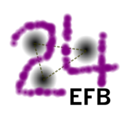Speaker
Description
Shallow donor impurities in silicon, once frozen out at low temperature, share many properties in common with free hydrogen atoms, with a single electron orbiting a singly positively charged ion core. Phosphorus donors in silicon show extremely long spin relaxation lifetimes making them very attractive for encoding quantum information, and the orbitals are very large, suggesting good prospects for precise control over interactions between neighbours. We have demonstrated temporal coherent control of orbital superpositions, using photon echoes, Ramsey interference and donor-donor interactions etc. Since silicon doped with phosphorus (Si:P) is an industry standard dopant, the technology for electrical contacting for initialization, gating and readout is pretty well established. Si:P can now be placed in a device, with a precision approaching the bond length, using a scanning-probe-based lithography technique. At Surrey we have been developing a complementary nanometer-scale implantation facility with much greater flexibility in species (at the price of trade-off with precision), and are now beginning to be able to produce spatial control required for few-body experiments. I will describe the donor-donor interaction experiments performed so far (on randomly arranged donors) and progress on deterministic placement.




